ISO Certifications for Cider Production Businesses, Requirements and Benefits

Introduction
Cider production businesses operate in a tightly regulated and quality-critical environment where product safety, fermentation control, hygiene, traceability, alcohol compliance, and brand consistency directly affect market access and consumer trust. These businesses manage apple sourcing, fermentation, blending, filtration, carbonation, bottling or canning, storage, and distribution, often across seasonal production cycles and multiple product variants.
With growing consumer demand for craft and premium ciders, stricter alcohol and food safety regulations, and increasing export opportunities, cider producers are under pressure to demonstrate structured manufacturing controls and transparent governance. ISO certifications have therefore become an essential framework for cider production businesses to ensure food safety, maintain consistent product quality, meet regulatory requirements, and strengthen credibility with distributors, retailers, and regulators.
In cider making, flavor starts in the orchard—but trust is built in the system.
Quick Summary
ISO certifications provide cider production businesses with internationally recognized frameworks to manage food safety through ISO 22000, quality consistency through ISO 9001, environmental responsibility through ISO 14001, occupational health and safety through ISO 45001, energy efficiency through ISO 50001, information and traceability controls through ISO/IEC 27001, and business continuity through ISO 22301. These certifications help cider producers ensure safe fermentation, consistent quality, regulatory compliance, and sustainable growth.
For more information on how we can assist your cider production business with ISO certifications, please contact us at [email protected]
Applicable ISO Standards for Cider Production Businesses
Below are the most relevant ISO standards applicable to cider producers, craft cideries, and industrial cider manufacturing plants:
ISO 9001: Quality Management Systems (QMS)
ISO 9001 supports structured control of apple sourcing, fermentation parameters, blending ratios, carbonation levels, packaging integrity, labeling accuracy, and customer feedback, ensuring consistent cider quality across batches.
ISO 22000: Food Safety Management Systems
ISO 22000 is the foundation standard for cider production. It integrates HACCP principles with prerequisite programs to control hazards related to raw fruit quality, fermentation, microbiological stability, alcohol content control, packaging hygiene, and storage conditions.
ISO 14001: Environmental Management Systems
Cider production generates organic waste, wastewater, and by-products such as pomace. ISO 14001 helps manage environmental impacts, waste disposal, water usage, and regulatory compliance.
ISO 45001: Occupational Health and Safety Management
Cideries involve pressurized vessels, CO₂ release, wet floors, and machinery. ISO 45001 reduces workplace hazards and improves employee safety.
ISO 50001: Energy Management
Fermentation temperature control, refrigeration, carbonation, and bottling are energy-intensive. ISO 50001 enables systematic energy efficiency improvement and cost reduction.
Click here to find out more applicable standards to your industry
What are the Requirements of ISO Certifications for Cider Production Businesses?
Cider producers seeking ISO certification must establish and maintain documented policies, procedures, and records aligned with the selected ISO standards. Key requirements include the following:
ISO 22000:2018 – Food Safety Management Systems
Establish food safety policies and objectives
Conduct hazard analysis for fermentation and packaging
Maintain hygiene, traceability, and recall systems
ISO 9001:2015 – Quality Management Systems
Define controlled production and quality processes
Monitor product conformity and customer requirements
Implement corrective actions and continual improvement
ISO 14001:2015 – Environmental Management Systems
Identify environmental aspects such as wastewater and organic waste
Implement waste and effluent control measures
Monitor regulatory compliance
ISO 45001:2018 – Occupational Health and Safety
Identify hazards related to machinery, CO₂, and wet areas
Implement safety training, PPE, and emergency procedures
ISO 22301:2019 – Business Continuity Management
Identify critical production stages and suppliers
Develop contingency and recovery plans
Tip:Start by mapping your cider production lifecycle—from apple reception and fermentation to bottling, storage, and distribution—against ISO requirements to identify food safety, quality, and compliance gaps early.
For further information on how we can assist your cider production business with ISO certifications, contact us at [email protected]
What are the Benefits of ISO Certifications for Cider Production Businesses?
ISO certifications are suitable for craft cideries, commercial cider producers, and export-oriented beverage manufacturers. Key benefits include:
Improved food safety and fermentation control, reducing spoilage risks.
Consistent taste, alcohol content, and carbonation, strengthening brand trust.
Enhanced compliance with alcohol and food regulations, easing inspections.
Better control of waste, water, and energy use, improving sustainability.
Safer working conditions for production staff, reducing incidents.
Stronger credibility with distributors and retailers, supporting market access.
The global cider market has experienced steady growth driven by consumer preference for low-to-moderate alcohol beverages and craft products. Industry analysis estimates that the global cider market is projected to surpass USD 10 billion in the near future, with strong demand in Europe, North America, and emerging markets in Asia-Pacific.
At the same time, regulatory oversight on alcohol labeling, food safety, and production hygiene is increasing. Benchmarking shows that cider producers implementing structured food safety and quality management systems achieve 20–30% reductions in batch rejections, spoilage losses, and regulatory non-conformities. ISO 22000-aligned governance is expected to become a baseline requirement for cider producers supplying organized retail, export markets, and multinational beverage distributors.
How Pacific Certifications Can Help?
Pacific Certifications, accredited by ABIS, acts as an independent certification body for cider production businesses by conducting impartial audits against applicable ISO standards. Our role is to objectively assess whether documented management systems and production practices conform to international ISO requirements, based strictly on verifiable evidence and operational records.
We support cider producers through:
Independent certification audits conducted in accordance with ISO/IEC 17021
Practical assessment of real food safety, fermentation, and quality controls
Clear audit reporting reflecting conformity status and certification decisions
Internationally recognized ISO certification upon successful compliance
Surveillance and recertification audits to maintain certification validity
Contact Us
If you need support with ISO certification to recognise your cider production business, contact us at [email protected] or +91-8595603096.
Author:Ashish
Read more: Pacific Blogs
